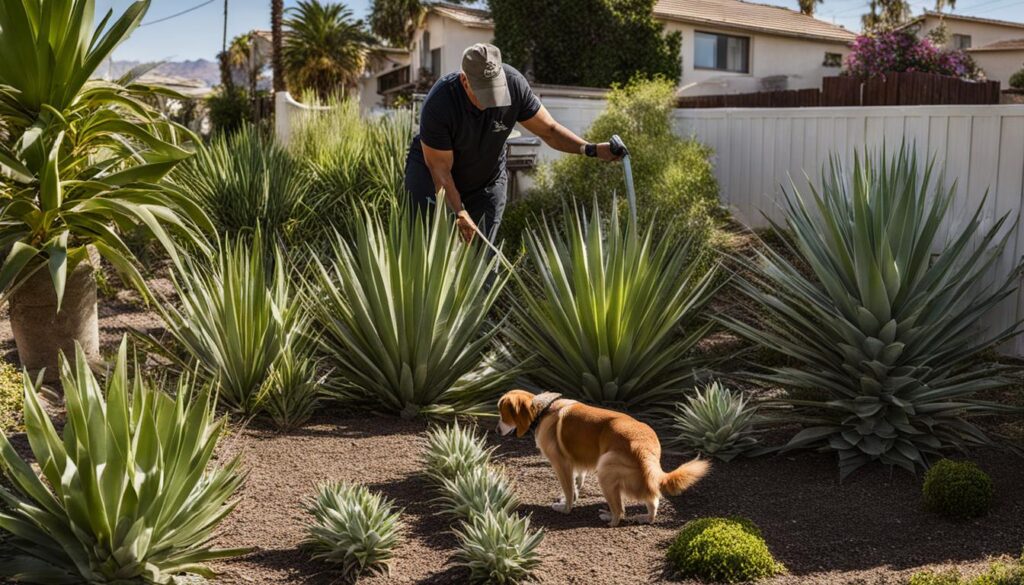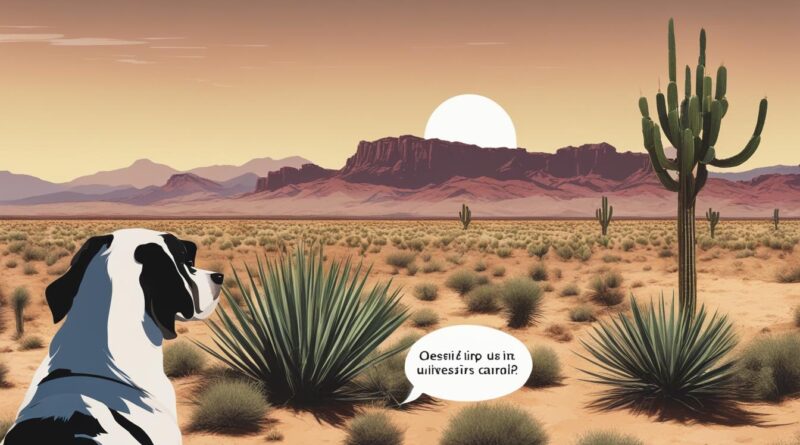Can Dogs Eat Yucca? Safety and Tips Guide
Yucca plants and dogs may not be a safe combination. As a responsible dog owner, it’s important to understand the potential risks associated with feeding yucca to dogs. Yucca plants contain steroidal saponins, which can be toxic to dogs and lead to various symptoms and complications.
If dogs consume yucca, it can cause drooling, vomiting, weakness, incoordination, and dilated pupils. While mild vomiting and diarrhea are more common in dogs, it is best to avoid feeding yucca to your furry friend altogether to ensure their well-being.
Key Takeaways:
- Yucca plants contain toxic substances that can be harmful to dogs.
- Ingesting yucca can lead to symptoms such as vomiting, diarrhea, weakness, and dilated pupils.
- If your dog consumes yucca, it is crucial to seek veterinary help immediately.
- Yucca plants should be kept out of your dog’s reach to prevent accidental ingestion.
- Consider dog-safe alternatives to yucca plants to ensure your pet’s safety.
Can Dogs Eat Yucca Plants?
Yucca plants are highly toxic to dogs. Ingesting any part of the plant can cause a range of symptoms that can be harmful to your beloved pet. These symptoms include:
- Drooling
- Sickness
- Weakness
- Lack of coordination
- Bloating
- Abdominal pain
- High blood pressure
- Loss of consciousness
- Breathing difficulties
It is important to note that yucca plants can also cause injuries to the mouth and, if swallowed, may result in intestinal blockage.
If you suspect that your dog has consumed yucca plants, it is crucial to contact your veterinarian immediately for guidance and proper diagnosis. Swift action can help ensure the best possible outcome for your pet’s health and well-being.
| Symptoms |
|---|
| Drooling |
| Sickness |
| Weakness |
| Lack of coordination |
| Bloating |
| Abdominal pain |
| High blood pressure |
| Loss of consciousness |
| Breathing difficulties |
Diagnosis of Yucca Plant Toxicity in Dogs
When it comes to diagnosing yucca plant toxicity in dogs, veterinarians employ a comprehensive approach. This typically begins with a thorough physical examination, which includes assessing various vital signs and overall condition. Some of the key factors that veterinarians evaluate during the examination include:
- Heart rate
- Breath sounds
- Respiratory rate
- Blood pressure
- Body temperature
- Weight
- Reflexes
- Oxygen levels
These observations help the veterinarian gain an understanding of the dog’s current health status. However, to gain further insight and confirm yucca plant poisoning, additional tests may be necessary.
Laboratory tests play a crucial role in confirming the diagnosis of yucca plant toxicity in dogs. Some common laboratory tests include:
- Biochemical profile: This test helps evaluate various organ functions and electrolyte balance.
- Complete blood count (CBC): A CBC provides information about the dog’s blood cells, such as red blood cells, white blood cells, and platelets.
- Urinalysis: Urine analysis aids in evaluating kidney function and identifying any abnormalities.
- Blood urea nitrogen (BUN): This test helps assess kidney function and can indicate the severity of the poisoning.
- Electrolyte and glucose levels: These tests help determine the dog’s electrolyte balance and glucose levels, as yucca poisoning can disrupt these levels.
Ideally, a veterinarian may also perform endoscopy to inspect the esophagus and remove any remaining yucca plant material. In some cases, additional imaging tests such as x-rays, CT scans, MRIs, or ultrasounds may be necessary to evaluate the extent of the poisoning or identify any complications.
Detecting Yucca Plant Toxicity
If a dog exhibits symptoms such as vomiting, diarrhea, weakness, or any other signs of yucca plant poisoning, it is crucial to seek immediate veterinary assistance. A prompt diagnosis and appropriate tests can ensure accurate treatment and improve the chances of a successful recovery.
| Diagnostic Procedures | Purpose |
|---|---|
| Physical examination | To assess overall condition and vital signs |
| Laboratory tests | To evaluate organ function and electrolyte levels |
| Endoscopy | To view the esophagus and remove plant material |
| Imaging tests (x-rays, CT scans, MRIs, ultrasounds) | To visualize the extent of poisoning or identify complications |
Remember, if you suspect your dog has ingested yucca plants, it is vital to consult with a veterinarian and follow their expert guidance for diagnosing and treating yucca plant toxicity.

Treatment for Yucca Plant Toxicity in Dogs
When it comes to the treatment for yucca plant toxicity in dogs, swift veterinary interventions are essential. The specific course of treatment will depend on various factors, including the time elapsed since ingestion.
If a dog has recently consumed yucca plants, the first step may involve inducing vomiting to remove the toxins from their system. This is typically done under the supervision of a veterinarian to ensure it is done safely and effectively.
In cases where immediate vomiting is not possible, activated charcoal may be administered to prevent further absorption of toxins in the digestive system. Activated charcoal can help bind the toxins and facilitate their elimination from the body.
Additionally, intravenous fluid therapy may be necessary to combat dehydration and help support the dog’s overall health during the recovery process. Hospitalization and repeated blood tests may also be recommended to monitor the dog’s response to treatment and ensure proper organ function.
It is important to emphasize that attempting home remedies or treatments without professional guidance can be dangerous and potentially exacerbate the dog’s condition. Seeking veterinary care as soon as possible is crucial for the best outcome.
Veterinary Interventions for Yucca Plant Poisoning in Dogs
“When it comes to yucca plant poisoning in dogs, prompt veterinary interventions are crucial in minimizing the potential harm. Time is of the essence, and seeking professional help ensures the best chance of a successful recovery.” – Dr. Sarah Johnson, DVM
Yucca Plant Ingestion Management for Dogs
In addition to the specific treatments mentioned earlier, managing yucca plant ingestion in dogs involves providing supportive care throughout the recovery process. This may include monitoring vital signs, administering medications to alleviate symptoms, and offering a bland diet to ease gastrointestinal distress.
It is also important to keep a close eye on the dog’s behavior and overall well-being during the recovery period. Any concerning changes or persistent symptoms should be promptly reported to the veterinarian for further guidance.
Summary Table: Treatment Approaches for Yucca Plant Toxicity in Dogs
| Treatment Approaches | Description |
|---|---|
| Inducing vomiting | Performed under veterinary supervision to eliminate toxins from the dog’s system |
| Administering activated charcoal | Helps bind and eliminate toxins, preventing further absorption |
| Intravenous fluid therapy | Provides hydration and supports overall health during recovery |
| Hospitalization and monitoring | May involve repeated blood tests and close observation to ensure progress |
Yucca Plant Poisoning and Plant Safety Tips for Dogs
To prevent yucca plant poisoning in dogs, it is crucial to keep yucca plants out of their reach. Yucca plants contain toxic compounds that can harm dogs if ingested. The best way to ensure your dog’s safety is to avoid having yucca plants in your home or yard altogether.
“Dog-Safe Alternatives for Houseplants”
If you want to have indoor plants, there are several dog-safe alternatives to yucca that you can consider:
- Spider Plants
- Boston Ferns
- Areca Palms
- Money Trees
- Calathea
These plants are non-toxic to dogs and can add greenery to your home without posing any health risks. However, it’s important to remember that even dog-safe plants should be placed in areas that are inaccessible to your furry friends to prevent them from causing any mischief.
“Educate Yourself About Toxic Plants for Dogs”
In addition to avoiding yucca plants, it’s essential to educate yourself about other toxic plants that can be harmful to dogs. Some common examples include:
Azaleas – These beautiful flowering plants are toxic to dogs and can cause symptoms such as vomiting, diarrhea, drooling, and even more severe complications.
Lilies – Many species of lilies, including Easter lilies, can be highly toxic to dogs, particularly to their kidneys.
Peace Lilies – While peace lilies are popular indoor plants, they contain compounds that can cause oral irritation, difficulty swallowing, and other negative reactions in dogs.
By familiarizing yourself with toxic plants, you can create a safe environment for your four-legged companions and prevent any potential accidents or health issues.

Remember, the well-being and safety of your dogs should always be a top priority. By keeping yucca plants out of their reach and opting for dog-safe plant alternatives, you can prevent yucca plant poisoning and ensure a happy and healthy home for your furry friends.
Expert Veterinary Advice on Yucca Plant Toxicity in Dogs
When it comes to the safety of your furry friend, veterinarian Evie Moloney provides valuable insights into yucca plant toxicity in dogs. Yucca plants, commonly found in many households, can pose a serious threat to dogs if ingested. Even if your dog does not display immediate symptoms, it is crucial to seek veterinary advice if you suspect yucca plant ingestion.
With their extensive knowledge and expertise, veterinarians can offer a proper diagnosis, recommend appropriate treatments, and guide you in managing yucca plant toxicity in dogs. By consulting a professional as soon as possible, you greatly increase the chances of a successful recovery for your beloved pet.
Remember, your veterinarian is your most reliable source of information and support when it comes to yucca plant toxicity in dogs. Trust their expertise and follow their recommendations to ensure the well-being and safety of your canine companion.
Conclusion
In conclusion, it is important to note that yucca plants are toxic to dogs and should never be ingested. The ingestion of yucca can result in a range of symptoms and complications for dogs, including vomiting, diarrhea, weakness, and even intestinal blockage.
If you suspect that your dog has consumed yucca plants, it is crucial to seek immediate veterinary assistance. A vet will be able to provide the necessary guidance, diagnosis, and appropriate treatment for yucca plant toxicity in dogs.
To ensure the safety of your furry friend, remember to keep yucca plants out of their reach. It is advisable to opt for dog-safe plant alternatives in your home and yard. By taking these precautions and working closely with your veterinarian, you can help protect your dog from the dangers of yucca plants.
FAQ
Can dogs eat yucca?
No, dogs should not eat yucca. Yucca plants are toxic to dogs and can cause various symptoms and complications.
What are the symptoms of yucca plant poisoning in dogs?
Symptoms of yucca plant poisoning in dogs may include drooling, vomiting, weakness, lack of coordination, bloating, abdominal pain, high blood pressure, loss of consciousness, and breathing difficulties.
How is yucca plant toxicity in dogs diagnosed?
Veterinarians can diagnose yucca plant toxicity in dogs through a physical examination, including assessing overall condition and performing laboratory tests such as a biochemical profile, complete blood count, and urinalysis. Imaging tests may also be necessary.
What is the treatment for yucca plant toxicity in dogs?
The treatment for yucca plant toxicity in dogs depends on various factors and may include inducing vomiting, administering activated charcoal, providing intravenous fluids, and hospitalization for monitoring and further treatment.
How can yucca plant poisoning in dogs be prevented?
To prevent yucca plant poisoning in dogs, it is important to keep yucca plants out of their reach and opt for dog-safe plants as alternatives. Educate yourself about other toxic plants for dogs and avoid having them in your home or yard.
What is the expert veterinary advice on yucca plant toxicity in dogs?
According to veterinarian Evie Moloney, dogs should not consume yucca plants, and if ingestion is suspected, immediate veterinary advice should be sought for proper diagnosis and treatment.

